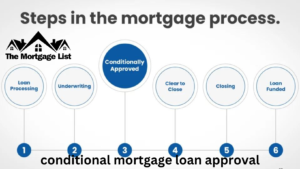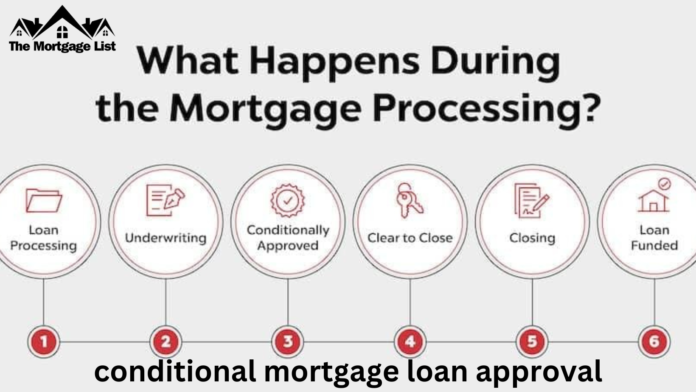Understanding Conditional Mortgage Loan Approval
Conditional mortgage loan approval is a crucial step in the home buying process. It signifies that a lender has tentatively agreed to provide you with a mortgage, pending certain conditions being met. These conditions typically include factors such as satisfactory property appraisal, income verification, and title search.
The Conditional Approval Process
Submitting Your Application
The journey towards conditional mortgage loan approval begins with the submission of your mortgage application. This comprehensive document outlines your financial situation, employment history, credit score, and other pertinent details.
Initial Review by the Lender
Once your application is submitted, the lender conducts an initial review to assess your eligibility for a mortgage. This involves scrutinizing your credit report, verifying your income, and evaluating your debt-to-income ratio.
Conditional Approval
If the initial review yields positive results, you’ll receive conditional approval for your mortgage. This stage indicates that the lender is prepared to extend a loan to you, contingent upon satisfying specific requirements.

Conditions for Approval
Conditional approval comes with a set of conditions that must be fulfilled before the loan can proceed to closing. These conditions typically include providing additional documentation, such as recent pay stubs, bank statements, and tax returns.
Meeting Conditional Approval Requirements
Providing Documentation
To move forward with your mortgage application, you must promptly supply any documentation requested by the lender. This may include proof of employment, income verification, and details about your assets and liabilities.
Addressing Property Requirements
In addition to personal documentation, you may need to address specific property-related conditions. This could involve obtaining a satisfactory home appraisal, securing homeowners insurance, or resolving any title issues.
Resolving Credit Concerns
If there are any concerns about your credit history, you may need to take steps to address them. This could include paying off outstanding debts, correcting errors on your credit report, or explaining any past credit issues.
Benefits of Conditional Approval
Confidence in Your Buying Power
Conditional mortgage loan approval gives you confidence in your buying power as you search for your dream home. With a conditional approval letter in hand, sellers are more likely to view your offer favorably, knowing that you’re a serious and qualified buyer.
Streamlined Closing Process
By addressing potential issues upfront during the conditional approval stage, you can streamline the closing process. This reduces the likelihood of last-minute surprises or delays, allowing for a smoother and more efficient transaction.

Negotiating Power
Having conditional approval strengthens your negotiating power when it comes to price and terms. Sellers may be more inclined to negotiate with buyers who have already taken the necessary steps to secure financing.
Conclusion
Conditional mortgage loan approval is a pivotal milestone on the path to homeownership. By understanding the process and diligently meeting the specified conditions, you can position yourself for success in securing the financing you need to purchase your dream home.
Frequently Asked Questions About Conditional Mortgage Loan Approval
1. What is conditional mortgage loan approval?
Conditional mortgage loan approval is a preliminary approval from a lender indicating that they are willing to provide a mortgage loan, subject to certain conditions being met by the borrower. These conditions typically include factors such as satisfactory property appraisal, income verification, and title search.
2. How does conditional approval differ from final approval?
Conditional approval is an initial step in the mortgage loan process, indicating the lender’s willingness to lend pending the fulfillment of specific conditions. Final approval, on the other hand, is granted once all conditions have been satisfied, and the loan is ready to proceed to closing.
3. What documents are required for conditional mortgage loan approval?
The documents required for conditional mortgage loan approval may vary depending on the lender and the borrower’s specific financial situation. However, common documents typically include:
- Completed mortgage application
- Evidence of income in the form of tax returns, W-2 forms, or pay stubs
- Bank statements
- Identity (a passport or driver’s license, for example)
- Employment verification
- Proof of assets and liabilities
4. How long does conditional mortgage loan approval take?
The timeline for conditional mortgage loan approval can vary depending on factors such as the lender’s workload, the complexity of the borrower’s financial situation, and the responsiveness of the borrower in providing required documentation. In general, conditional approval can be obtained within a few days to a few weeks.
5. What happens after conditional mortgage loan approval?
After receiving conditional approval, the borrower must satisfy the specified conditions outlined by the lender. This may involve providing additional documentation, addressing property-related issues, or resolving any concerns about credit history. Once all conditions have been met, the loan can proceed to final approval and closing.

6. Can conditional approval fall through?
Yes, conditional approval can fall through if the borrower fails to meet the specified conditions or if there are significant changes to the borrower’s financial situation during the approval process. It’s essential for borrowers to promptly provide requested documentation and address any issues that arise to ensure a smooth path to final approval.
7. Is conditional approval binding?
Conditional approval is not binding in the same way that final approval is. It signifies the lender’s tentative agreement to provide a mortgage loan pending the satisfaction of specific conditions. Until all conditions have been met and final approval has been granted, neither the borrower nor the lender is obligated to proceed with the loan.
8. How does conditional approval affect the home buying process?
Conditional approval gives borrowers confidence in their buying power as they search for a home. With a conditional approval letter, sellers are more likely to view offers favorably, knowing that the buyer has taken steps to secure financing. Conditional approval also streamlines the closing process by addressing potential issues upfront.

